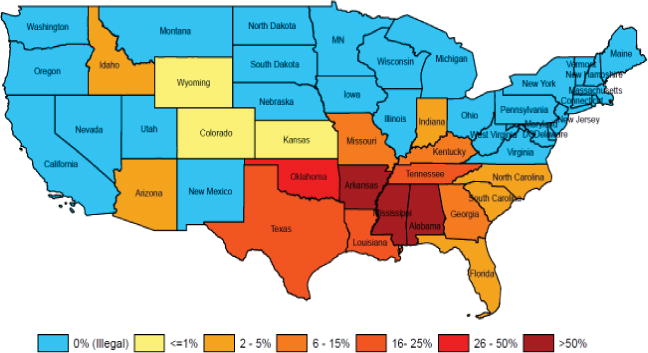Can Teachers Be the Bullies?
The use of corporal punishment by state in the US during the 2011-2012 school year. Corporal punishment in schools is still legal in 19 of the 50 US states.
We’ve all heard the stories from our parents’ childhoods: when they misbehaved at school, they would get hit with a paddle, a ruler, or something along those lines. While the practice of disciplining children through physical measures has become outdated in the past couple of decades, it is still allowed in the eyes of the law.
Corporal (physical) punishment, is legal in the public schools of 19 states including Colorado and in the private schools of 48 states. This year, a Georgia public school sent home permission slips to the parents of its students asking for permission to use corporal punishment with a wooden paddle after two warnings. The parents would also be notified before the punishment was executed. Despite the fact that it is legal in Georgia and the parents have to consent to allow the use of corporal punishment, it has a sparked a nationwide controversy.
The school received mixed reactions from its parents, with a range from, “I’m glad that this is back,” to “I can’t believe this is happening again.” About one-third of the permission slips returned gave consent to the punishment of three licks with the wooden paddle.
In my opinion, corporal punishment should not be allowed in schools, which are some of the last institutions in America that allow it. It was made illegal in British schools in the late 1980s and America has been slow to follow the trend. While many parents still agree with the occasional spanking on their own, up to 77% of the American population disagrees with it in schools.
In addition to the lack of support from the population, corporal punishment has been shown to have negative effects on the children it is administered to and an ineffective method of discipline. Children punished using physical methods show higher levels of aggression and are less likely to respond to the authority figure who punishes them (parents or teachers), because of the formation of a bully-like relationship. Long-term effects of corporal punishment include higher rates of mental health problems, physical abuse, and lower test scores.
These negative effects render the use of corporal punishment essentially useless; if it is only used on children as a last resort then it will often be used on those with severe behavioral problems, only increasing the issues rather than treating them. There are more effective ways to reteach a child how to act.
While the side effects speak for themselves, the use of corporal punishment in schools is outright wrong. The school administrators are not of high enough authority with the children to make the decision about how they should be treated, and the children are forced into an unhealthy relationship. The authority of the teachers or principals forces the kids into uncomfortable situations where they may feel violated and out of control which is extremely unhealthy and fosters the ideas of the assertion of control through violence into their ideas.
I firmly believe that if we want to teach our children to live without violence in their lives, we cannot use violence to punish them. Children have very malleable beliefs, so they are likely to pick up on the habits that they see being used around them. If we use violence, they are likely to reflect violence in their daily lives too. Instead, we as a society should focus on allowing our children to make mistakes and feel what they want to, and then explaining to them how they can cope more effectively or why they are feeling the way they are.

Karenna Doctor is a Senior at Rocky Mountain High School and is also a staff member of the school literary and arts magazine, The Looking Glass. Outside...




